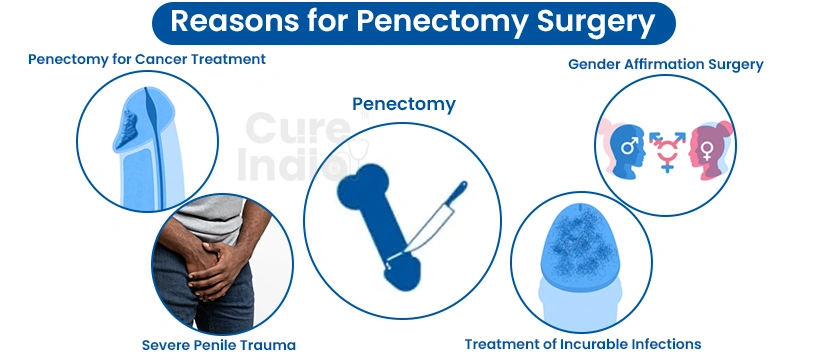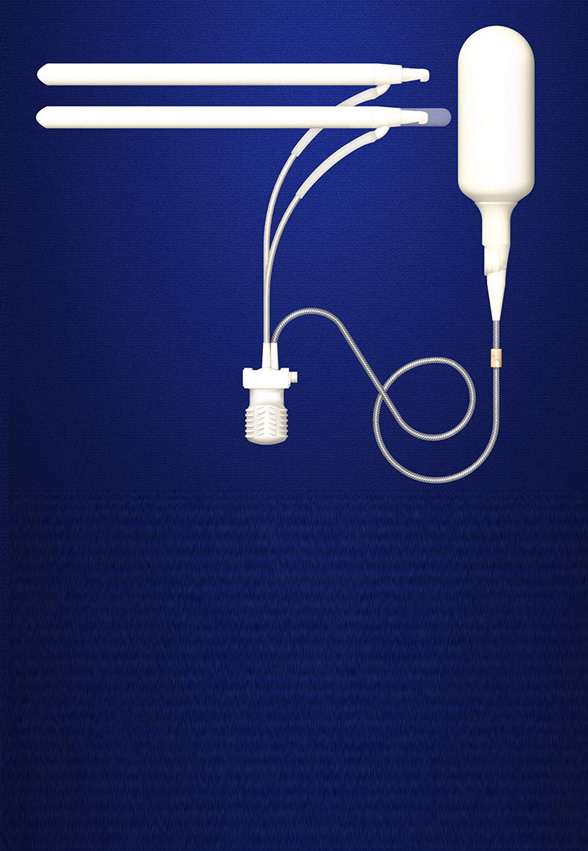

Penectomy is a specialised surgery which involves the partial or complete removal of the penis,for treating advanced penile cancer or severe trauma. The treatment plan is carefully determined based on the underlying diagnosis, disease stage, and the patient’s health.
As the procedure directly affects the male reproductive and urinary systems, a penectomy surgery requires thorough evaluation, precise surgical expertise, and proper post-operative care. Successful outcomes depend on close coordination between the patient and an experienced medical team.
This page will discuss penectomy surgery in India, including its purpose, types, surgical approach, recovery, and potential impact on a patient’s quality of life. It also highlights the benefits of choosing India for treatment, along with information on leading doctors, hospitals, and treatment costs.
Penectomy is a surgery including the removal of the penis. This irreversible activity is frequently performed for clinical reasons, like,
The patient goes through guiding before settling on penectomy. Furthermore, in post-medical procedures, people might investigate reconstructive choices. It is done for corrective purposes. Generally, the procedure is a critical clinical mediation. The procedure is critical with both physical and mental ramifications.
It is an operation embraced considering multiple factors and each case is remarkable. The choice for the penectomy is providing cautious thought of the singular's particular ailment. It is prosperity.

Penectomy is many times proceeded as an essential mediation within the sight of penile disease. At the point when malignancies influence the penile tissues, careful expulsion becomes basic. This procedure also takes out carcinogenic cells and anticipates the spread of the illness to nearby regions.
Penectomy is a vital part of the orientation confirmation medical procedure. It is commonly performed for individuals transitioning from male to female. This innovative method adjusts actual qualities to orient character. It promotes mental prosperity and also a sense of unity.
In instances of extreme penile injury causing irreparable harm, a penectomy might be necessary. It addresses the extent of the injury. It aspires to restore overall urological capability.
Chronic infections, inert to other clinical intercessions, may require penectomy. This uncommon measure aims to eliminate the infection and prevent further problems. It also aims to safeguard general health from possible dangers.
A Penectomy surgery in India is a careful mediation for different clinical reasons. It comes in two essential structures: Total Penectomy and Partial Penectomy.
Total or radical penectomy includes the total removal of the penis. If there has been severe penile malignant growth, this technique is often conducted. Here, the degree of the illness requires radical extraction. It requires an intense measure to predict the spread of disease to neighboring tissues and organs. After a complete penectomy, patients may undergo reconstructive medical procedures. For instance, phalloplasty serves to restore some appearance of normalcy.
Partial Penectomy involves the evacuation of a piece of the penis. This method is a viable option for localized disease in numerous situations. It is also applicable when it hasn't penetrated the whole organ. It takes into consideration a safer methodology. The procedure saves a few practical and tasteful parts of the penis. The choice among aggregate and halfway penectomy relies upon factors, such as,
While Penectomy is a critical operation, its advantages reach past actual viewpoints. Understanding the various purposes of penectomy is vital in clinical settings. The benefits of penectomy surgery in India include:

Penectomy procedure fills in as an essential therapy for penile malignant growth. It eliminates destructive tissues, forestalling additional spread.
For people facing troubling genital circumstances, a penectomy can alleviate physical discomfort. It enhances overall well-being and comfort.
Penectomy is undertaken in serious or persistent circumstances affecting the penis. The procedure aims to limit the risk of spreading infections to different body parts.
This medical procedure can contribute to improving mental health. It addresses mental challenges related to penile circumstances. Also, it fosters a positive self-view.
Penectomy can address practical issues linked with the penis. It aims to restore urinary and reproductive efficiency. Hence, it plays a crucial breakthrough in situations where other treatments have proven ineffective.
The cost of penectomy in India is determined on a case-by-case basis, depending on factors such as the hospital, surgeon, type of surgery (partial or total), and post-operative care. The average cost of penectomy surgery in India is around $2,500 with CureIndia. This cost is much affordable when compared to countries like the US and the UK.
| Treatment Name | Cost in India | Stay in India |
|---|---|---|
| Penectomy Surgery in India | $1,000 - $1,500 | 7 Days |
Undergoing Penectomy is a life‑altering decision. It is reserved for severe conditions such as advanced penile cancer or irreparable injury and demands the utmost surgical precision and postoperative support. In India, some of the most respected urologists and uro‑oncologists, working in top cancer and multi‑specialty centres have the experience and expertise required to perform penectomy surgery safely. These are our top doctors for penectomy surgery in India:
Dr. Gautam Banga is a specialised doctor for penectomy surgery in India. He holds an MBBS, an MS in General Surgery, and an M.Ch. in Urology. He specialises in reconstructive urology and andrology, with a focus on surgeries involving the urethra and external genitalia. Over his career, he has performed hundreds of complex reconstructive procedures, including urethroplasties, penile surgeries, and other related interventions.

Dr. Vineet Malhotra completed his MBBS from Jawaharlal Nehru Medical College, followed by an MS in General Surgery and a DNB in Urology/Genito-Urinary Surgery. He has over 25 years of experience in performing urology and andrology surgery, particularly for procedures such as penectomy. His practice includes a variety of urological treatments, from urinary and prostate problems to male reproductive and sexual health concerns.

Dr. Vijayant Govinda Gupta is a leading reconstructive penectomy surgeon in India. Dr. Gupta’s qualifications include MBBS, MS in General Surgery, and MCh in Urology. His expertise spans a wide range of urology and men's health treatments, including surgeries done with small tools, resolving urinary issues, treating injuries to the urinary system, and men's health problems.

Dr. Rajesh Ahlawat is a top urological oncologist in India. He has long‑standing experience of over 40 years in urology, including minimally invasive urology and renal transplant programmes. His background covers strong surgical experience in urological cancers and complex uro‑oncology, providing high success rates and results.

The penectomy procedure is often necessary for medical reasons. Proper preparation is pivotal for an effective result. Successful planning of penectomy medical procedures ensures the patient's physical and mental readiness. It is a bonus to a smoother recovery process.
First, an intensive clinical assessment is required to survey the patient's health. It includes surveying existing circumstances. It also contains guarantees they provide before medical procedures.
Patients undergo counseling to comprehend the implications of Penectomy. They discuss potential personal and psychological aspects during this process. This guides in the mental groundwork for the technique.
Itemized data about the medical procedure, it's possible dangers, and expected results is given. Detailed instructions are provided to the patient, to ensure awareness of the procedure and consent to it.
Patients get clear directions on preoperative arrangements. It includes fasting, drug charges, and any fundamental way of life alterations. All these are done before the medical procedure.
Laying out a hearty, emotionally supportive network is imperative. Family or companions can assume a critical part. They can offer close-to-home help at this preoperative stage. This can come as a huge support for the patient's mental prosperity.
Indeed, the understanding of the steps in a penectomy procedure emphasises precision. It also shows carefulness which is inherent in this clinical intervention. This contributes to successful outcomes and improves patient well-being. The removal of part or the total penectomy surgical technique follows a systematic series of steps. These steps ensure efficacy and guarantees patient well-being:

Before the procedure, a far-reaching assessment surveys the patient's general well-being. This assessment includes the patient's clinical history too. This basic step guarantees that the one is in great shape for a medical procedure. This step also distinguishes the difficulties.
The patient goes through sedation to relax during a medical procedure. Sedation can be general or provincial, it depends upon the degree of the penectomy.
The specialist makes an entry point considering the arranged degree of penectomy. They isolate the penis from surrounding tissues and protect the penis. It requires a cautious analysis and expertise.
Vascular designs are thoroughly controlled to limit dying. The penectomy surgical technique involves the removal of penile tissue. The procedure is done while safeguarding adjacent structures. The specialist extracts the organ in total penectomy surgery.
The entry point site is fastidiously shut, and postoperative consideration starts. Checking for obstacles, managing pain, and providing mental support are essential aspects. This helps in the recovery process.
A penectomy medical procedure is designed to address various problems. It necessitates the partial or complete removal of the penis. Understanding the process of recovery for penectomy surgery in India can help:
During the underlying days post-penectomy, patients are firmly checked for any confusion. The doctors take an imperative part in guaranteeing solace. It helps in working with the healing cycle. Prescriptions are endorsed to ease pain and diminish irritation.
Supportive care for the wound is essential for healing. Patients get guidelines on injury care. One must keep the region spotless and dry. Experts assist with follow-ups with medical services observing the recovery progress.
We cannot ignore the mental effects one feels after the procedure. Experts do their part in motivation. They guide people during the healing period. This helps them adapt to the tremendous changes to their bodies and emotional health.
Exercise plays a crucial role in recovery. It is suggested to address any difficulties. This usually includes movements. It indeed has its effectiveness.
Long-haul follow-up care is urgent to screen for any expected complexities. Also, it evaluates general recovery. Regular clinical check-ups help ensure the patient's well-being. This provides a comprehensive approach to post-penectomy care.
Penectomy surgery is a vital clinical mediation. Through meticulous methods, it tends to differ the well-being concerns. Penectomy offers help and upgrades patients' general prosperity. Subsequently, the medical procedure empowers people to recover command over their lives. Fundamentally, It is an incredible arrangement, giving both physical and profound advantages. It remains a showcase of clinical progressions, and offers trust along with recovery.


Suffering from Erectile Dysfunction
Open up and get treated
Semi Rigid and Inflatable Penile Implants
Get back the Erection
Insecure about your size
Get Penile Augmentation